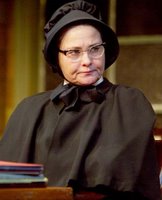
It seems so rare these days that one goes to the theater and be expected to participate on such an intellectual level. Not just participate, but be challenged, to have your own ideas of right and wrong be so forcefully questioned. When the play ended, everyone had something to say. Families were broken up, couples were polarized. (Well, basically. I mean, not really.) Everyone was sure that they were in the right as to whether 1) Father Flynn was guilty, and 2) The mother of the boy was right or wrong, and 3) Sister Aloysius made the right choice, or was irresponsible. There are so many questions raised.
Ultimately, the play is not only about if he did or if he didn't. It's about the fragility of faith, and the strange nature of justice. Or rather, is there justice?
I heard Cherry Jones talking on the radio during the show's run, about the mechanics of acting in Doubt. She said that the director, Doug Hughes, had a private conversation with Brian F. O'Byrne about whether or not his character, Father Flynn, was indeed guilty or not. After all, as an actor, you can only play intention, you can not play "maybe I did, or maybe I didn't." Ms. Jones didn't want to know his final choice. She thought her performance would be more believeable if she genuinely didn't know.
It was more believable. She went home with the Tony, the Drama Desk, the Outer Critics Circle Award, and the Lucille Lortel. Plus! Ms. Jones is an out lesbian, and she's from Tennessee.



No comments:
Post a Comment